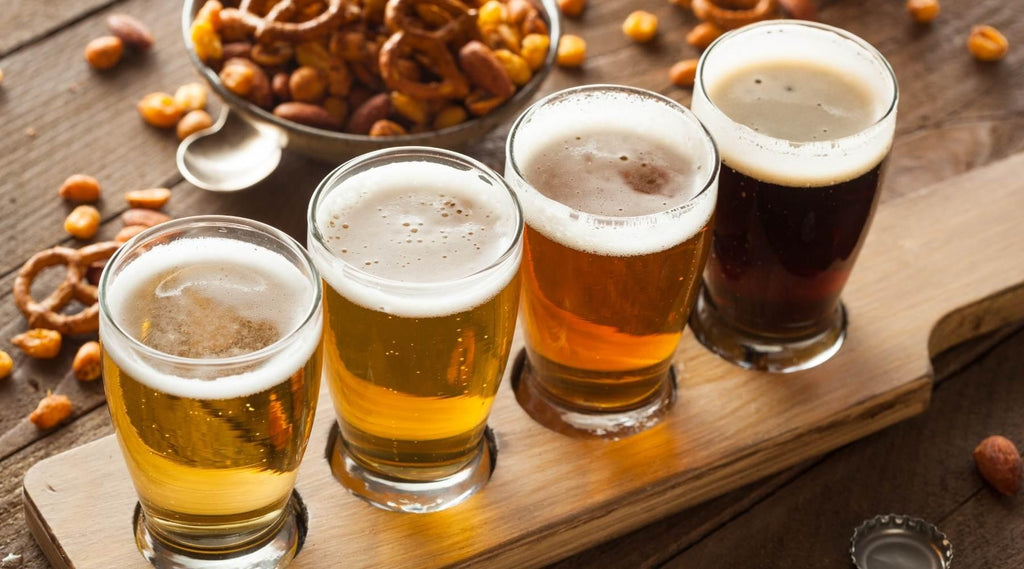
We all love cracking open a can of chilled beer in the hot summer months, and nothing quite beats meeting up with your friends and enjoying a beer together.
This may sound like a joke but we can assure you that it is not, there are some amazing health benefits of beer that may surprise you.
From cardiovascular health and kidney health to low blood pressure and increased cognitive function - you name it - the list goes on and on. So if this is the case, why is there such a stigma surrounding this delicious beverage?
As with anything good, moderation is key. The purpose of this article is not to encourage you to drink excessive amounts of beer but simply to offset the over-simple messaging that beer is bad.
How long have humans been drinking beer? A short history

Is alcohol really that bad? Well, surely if it was a major evolutionary defect then humans would have cut it out millennia ago!
Or that’s at least what Kate Julian of The Atlantic thinks. In her groundbreaking article ‘America has a drinking problem’, she draws light on some of the historic social and economic advantages of alcohol - notably how it encouraged human cooperation, collaboration, and creativity.
Likewise, Edward Slingerland, in his book Trying Not to Try: The Art and Science of Spontaneity (2014) and at subsequent talks and conferences, has suggested that the act of intoxication could help humans achieve to Taoist idea of wu-whei. In other words, suppressing the conscious mind and unleashing subconscious creativity and sociability.
This somewhat subversive theory about alcohol has been further backed up by the excavation of Göbekli Tepe in Eastern Turkey. This site dates as far back as 10,000 B.C and for a long time puzzled archaeologists. Recent findings have, however, suggested that what was once thought to be a temple was a sort of ancient bar, club, pub - whatever you want to call it!
Indeed, drinking may be much more natural to human civilization than you may have previously thought.
What is the difference between vegan and non-vegan beer?
On the surface, beer may seem like a vegan-friendly drink. However, there are many things you need to take into consideration to determine whether the beer you’re drinking is 100% plant-based.
Two things you should look out for when browsing the beer aisle:
- Honey: Many mainstream beers are brewed in honey which is obviously something that should be avoided. That’s not all, you can also find oyster and cream stouts that you should not drink if you’re committed to being 100% vegan.
- Finings: Traditional breweries often use gelatin and insin-glass, which are animal byproducts, to clarify their beers. Fortunately for us vegans, this method is dying out and most breweries use modern filtration equipment. It’s unlikely you’ll come across this but may still be worth keeping an eye out for.
The beer benefits: for the body

Now let’s dive into the knitty gritty and find out how there may be some health benefits of beer. In moderate amounts, of course!
1. May have potential cardiovascular health benefits
Italian researchers have found that people that consumed beer regularly - the equivalent of 1 pint per day at a 5 percent alcohol volume - were less likely to develop heart disease in later life.
This surprising statistic is also backed up by EU researchers, who have suggested that moderate amounts of beer may be good for the heart and blood vessels because of the alcohol content.
“15–30 g of alcohol per day is associated with a 25% lower relative risk of cardiovascular disease mortality compared to abstainers.”
Though wine often takes first place when it comes to heart health, clearly beer is also in the running.
2. May reduce risk of type-2 Diabetes
You heard it right, moderate consumption of beer may even reduce the risk of developing type-2 diabetes.
Research conducted in Spain demonstrated that people who drink one pint of beer per day had a decreased risk of developing type-2 diabetes!
Similar studies carried out in the Netherlands found that out of 38,000 male health professionals, those that began drinking beer moderately over a four-year period had a lower chance of developing type-2 diabetes.
3. May be good for your kidneys
If you’ve experienced it, we’re sure you’ll never forget the debilitating pain of kidney stones. What if we told you that beer may possibly be the solution? Would you believe us?
Perhaps one of the bigger mysteries when it comes to beer benefits, is that regular and moderate beer drinking has been shown to significantly reduce the risk of developing kidney stones.
Following an extensive study, researchers in Finland concluded that men who drank a bottle of beer a day were 40% less likely to develop kidney stones at some point in their life.
However, alcohol consumption can negatively affect the kidneys. Alcohol dehydrates all of the cells in the body, including the kidneys. This dehydration can make them more susceptible to infection and disease, so make sure to not overdo alcohol consumption and limit your drinking to a maximum of 3 units per day.
4. May potentially aid workout recovery
When working out or exercising, you are effectively tearing apart cells in your body that will then be repaired and rebuilt, a process that is encouraged by eating high-protein foods.
Aside from being a great incentive when at the gym or on a cross-country run, beer may also be just the thing to help you beat dehydration. A recent study asked students to exercise until their body temperatures reached 104°. Once they reached this mark they were asked to rehydrate with either water or beer. Those who opted for beer appeared to be more hydrated. Weird and controversial, right?
That’s not all, drinking a beer post-workout can also be a great way to restore carbs - inevitably used up in a 60-minute workout - and boost electrolytes!
5. Highly nutritious
It feels like everyone’s always going on about how wine is highly nutritious and full of antioxidants but let’s have a bit of a closer look at beer.
Though the flavonoids in barley are different from those in the grapes used in wine, they are also an excellent source of antioxidants.
That’s not all, most beers are higher than wine in protein and, not to mention that beer also contains iron, calcium, phosphates, and fiber.
The beer benefits: for the mind

Just like the ancient people that would gather for a pint at Göbekli Tepe in Eastern Turkey, not much has changed between then and now. Most of us still enjoy getting together with friends and cracking open a cold one.
Even though it may seem a bit taboo, we think it is important to have an honest discussion about some of the psychological benefits of drinking beer.
1. Social lubricant
Best enjoyed in moderation, beer can be an effective social lubricant that promotes creativity and innovation, not to mention love and friendship.
Beer can be the perfect fuel for exchanging ideas. Some historians even credit the French Revolution to beer! Back in the 18th century in France, taverns and beer halls served as an important space wherein revolutionaries were able to mobilize the public against the ruling elite - resulting in the downfall of the French monarchy and the creation of the world’s first republic.
So clearly everyone’s favorite social lubricant can even be a driving force for social and political change. Woah.
2. Stress release
Overall the literature shows that moderate consumption of beer over a period of time can be an effective tool for reducing stress. It is important however to stress that this does not apply to heavy drinkers.
With all of this in mind, we do of course think that it is better to play on the side of caution and do not recommend nor do we condone the excessive consumption of beer, given the rates of alcoholism and substance abuse.
3. Help treat insomnia
Modern studies have uncovered that there may be a link between moderate regular drinking and treating insomnia.
Small amounts of alcohol, like the volume in beer, as well as the actual taste of beer can increase dopamine activity in the brain. Dopamine is a neurotransmitter that is responsible for us feeling calm and aroused.
Normally people suffering from insomnia have lower dopamine levels, so moderate and sensible beer drinking could be a quick and easy way to treat insomnia!
What are the dangers of drinking too much beer?
We all love cracking open a cold beer - and there are clearly some health benefits to drinking beer - but when is it time to say “enough is enough”? Heavy drinking can be extremely damaging and can provoke a range of different illnesses and health conditions - in the US, excessive drinking is the cause of death in around 10% of working-age adults.
And that’s a wrap

Clearly, there are some key potential health benefits of beer that need to be taken into consideration. Gone are the days when beer was just considered to be enough fattening, high-calorie beverage.
Here at PlantX, we want you to be in a position where you can weigh up all of the health benefits of beer as well as the disadvantages and enjoy beer in moderation!
Experts and health professionals advise that you should only really have one beer per day (about 12oz) and if you exceed this you will be considered a ‘heavy drinker’ and that’s where these beer studies seem a little less rosy.
Going back to what Kate Julian has to say on the issue. She suggests that we substitute excessive ‘binge’ drinking and adopt drinking habits like those seen in the Northern Mediterranean - where there are surprisingly low levels of heart disease and obesity.
In the Mediterranean diet, alcohol (including beer) can be enjoyed moderately and regularly with meals. Similarly, a fundamental aspect of the Mediterranean diet is community. Yes, that means no beer should only be enjoyed with friends and family!


